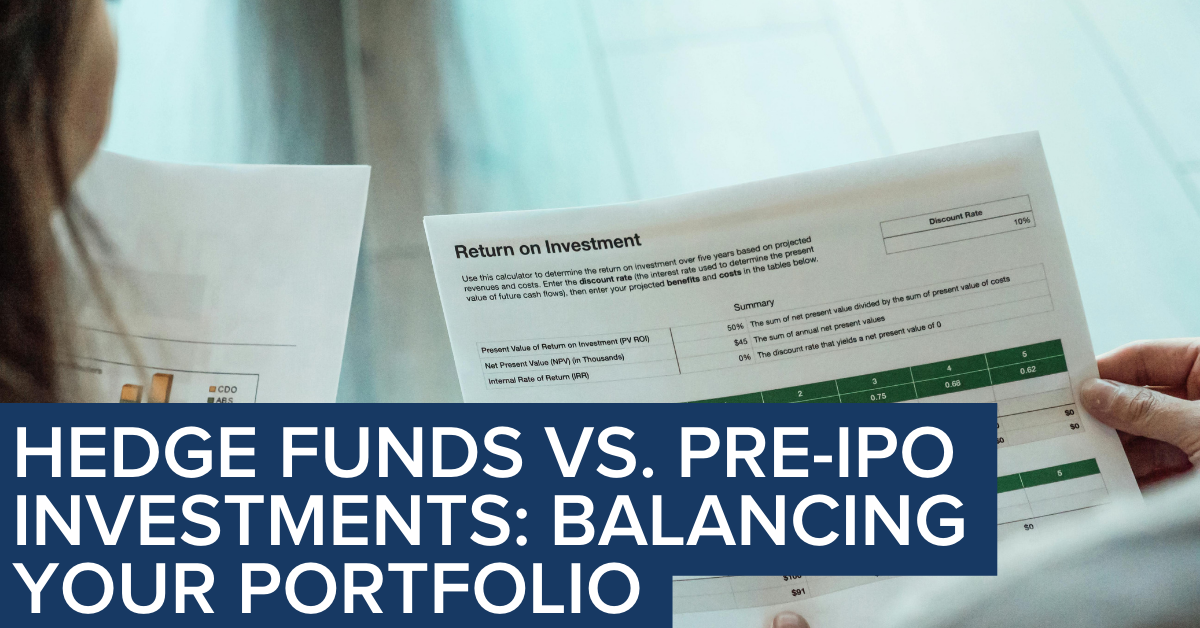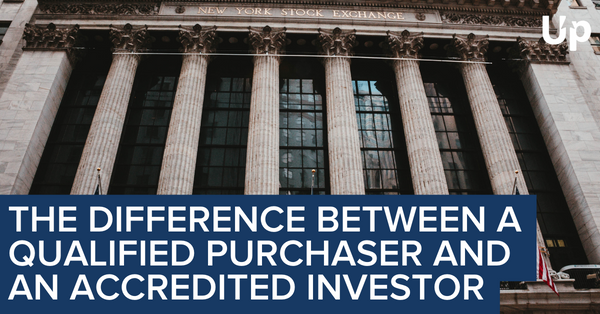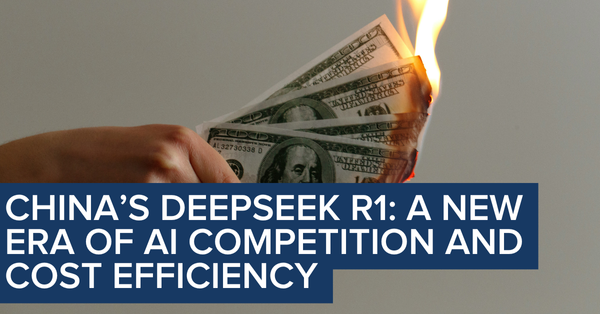Hedge Funds vs. Pre-IPO Investments: Balancing Your Portfolio

Alternative investments offer diverse opportunities for investors looking to expand beyond traditional stocks and bonds. Two popular options are hedge funds and pre-IPO investments.
Each has unique characteristics, risks, and potential rewards that can significantly impact your portfolio. While the allure of 10x, 20x, or even 30x returns from pre-IPO investments is strong, data comparing them to top-performing hedge funds suggests that pre-IPOs aren't always the best bet for reasons we'll explore below.
More than anything, these investments shouldn’t be considered in a vacuum; they should be pieced together in the context of an investment portfolio that is diversified and able to withstand market turbulence that will inevitably come to different strategies and asset classes.
The Allure of Pre-IPO Investments
Pre-IPO investments offer the exciting prospect of getting in on the ground floor of the next big thing. The potential for astronomical returns – think 10x, 20x, or even 30x – can be incredibly appealing. Who wouldn't want to be an early investor in the next Apple or Google?
However, the reality of pre-IPO investments is often more complex than these headline-grabbing success stories suggest. For every unicorn that delivers astronomical returns, countless others fail to live up to expectations or never make it to an IPO.
The path to going public can be long and uncertain, often taking years longer than initially projected. During this time, investors' capital is typically locked up, with little to no liquidity. Moreover, the lack of public market scrutiny and regulated disclosure requirements can make it challenging to assess a company's true value and prospects accurately. While the potential rewards are high, so are the risks, making pre-IPO investments a high-stakes game that requires careful consideration and often a strong stomach for uncertainty. By no means should investing solely in Pre-IPO companies be your retirement strategy.
Pros of Pre-IPO Investments:
- Potential for high returns if the company succeeds
- Opportunity to back innovative technologies and disruptive companies
Cons of Pre-IPO Investments:
- High illiquidity – your funds may be locked up for years
- Significant risk – the anticipated IPO might never materialize
- Concentration risk – your fortunes are tied to a single company, its management, and the growth of its industry
The Steady Hand of Hedge Funds
In contrast to the boom-or-bust potential of pre-IPO investments, hedge funds offer a different value proposition to investors. These professionally managed investment vehicles are designed to generate returns regardless of market direction, employing a wide range of strategies beyond traditional long-only investing.
Hedge funds can provide diversification benefits, access to sophisticated investment strategies and new asset classes, and deliver the potential for more consistent returns over time. Their ability to use leverage, short-selling, and derivatives allows them to pursue opportunities and manage risks in ways that are not typically available to individual investors or traditional mutual funds.
The "steady hand" of hedge funds comes from their professional management and risk control measures. Top-tier hedge fund managers bring deep expertise, extensive resources, and rigorous analytical processes to their investment decisions. They typically have access to a wealth of information and can react quickly to market changes. This professional oversight can be particularly valuable in complex or volatile market conditions.
Furthermore, many hedge funds offer better liquidity terms than pre-IPO investments, with regular opportunities for investors to redeem some or all of their holdings.
While hedge funds are not without their own risks and can experience periods of underperformance, their focus on risk-adjusted returns and capital preservation can provide a stabilizing influence in a diversified portfolio.
For investors seeking to balance the potential for high returns with more measured risk-taking, hedge funds can offer an attractive middle ground between the relative safety of traditional investments and the high-risk, high-reward nature of pre-IPO opportunities.
Pros of Hedge Funds:
- Diversification across strategies and asset classes
- Professional management and risk assessment
- Better liquidity compared to pre-IPO investments
- Potential for strong, consistent returns over time
Cons of Hedge Funds:
- Complex strategies that may be difficult to understand
- Higher fees compared to traditional investments
- Potential for volatility based on market conditions
Performance Comparison: The Surprising Truth
While the dream of a 10x return on a pre-IPO investment is alluring, it's important to consider the power of compound returns that a well-managed hedge fund can offer. Over a 10-year horizon, a hedge fund consistently delivering annual returns between 10% and 35% can match or even outperform some of the most successful pre-IPO exits.
In the chart below, you’ll see that a hedge fund annualizing at 35% (that’s a high return figure) will actually outperform a 20x pre-IPO exit. The chart is hypothetical and for illustrative purposes, but we believe investors love seeing how the data shakes out and that’s the goal of this chart:
This isn't to say that hedge funds are guaranteed to outperform pre-IPO investments, but it illustrates that chasing the "next big thing" isn't always the most effective strategy for long-term wealth building. The reality is that neither asset is “better” than the other; it is portfolio construction and your unique investment goals that matter.
The Key to Success: Portfolio Construction
The truth is, it's not about choosing between hedge funds and pre-IPO investments. Both can serve valuable roles in a well-constructed portfolio. Here's why:
- Diversification: Hedge funds can provide exposure to uncorrelated strategies and asset classes, helping to balance overall portfolio risk.
- Liquidity Management: The better liquidity profile of hedge funds can complement the locked-up nature of pre-IPO investments.
- Risk-Reward Balance: Pre-IPO investments offer the potential for outsized returns, while hedge funds may provide more consistent performance.
- Professional Oversight: Hedge funds offer the benefit of professional management, which can be particularly valuable in complex or volatile markets.
The Takeaway
As an informed investor, it's crucial to understand that neither hedge funds nor pre-IPO investments are inherently superior. The key lies in thoughtful portfolio construction that aligns with your financial goals, risk tolerance, and liquidity needs.
Combining the potential for high returns from pre-IPO investments with the diversification and professional management of hedge funds, you can create a balanced portfolio well-positioned for long-term success.
Remember, investing is not about chasing the highest possible returns at any cost. It's about building a resilient portfolio that can weather various market conditions while still offering growth potential. By understanding the pros and cons of different investment vehicles, you're taking an important step toward becoming a more sophisticated and successful investor.
Disclosure: The information contained in this article is not investment advice; and does not constitute a recommendation to buy or sell any securities. The information within this article is meant for informational purposes only. Any statement in this document does not mean that the firm nor its employees agrees, endorses or approves any content of the document.
This article is only for knowledge sharing and does not constitute any investment advice. Anyone who makes an investment decision based on this article does so at their own risk. Any fund investment should be made through a formal confidential private placement memorandum and other fund documents. Potential investors should carefully read the risk factors in the private placement memorandum of securities issuance, and consult their own professional consultants if necessary, and receive advice on any investment, legal, tax or accounting issues. Past performance is not indicative of future performance, and the investment may potentially result in a loss of principal. The source and data of the material are considered to be reliable. However, there is no guarantee of its accuracy or completeness. The Company has no obligation to disclose or revise or modify this statement or any forward-looking statements as the circumstances change or as a result of subsequent events. Private equity funds are only suitable for specific qualified investors to subscribe. United States sales of the fund interests are exempt under Regulation D of the U.S. Securities Act of 1933, and are only applicable to potential investors who are eligible as "Qualified Investors" under Regulation D. Sales outside the United States are exempt under Regulation S of the U.S. Securities Act of 1933. Private equity funds are sold through Upmarket Securities LLC. Upmarket Securities LLC is a U.S. registered broker-dealer, and member of FINRA.
About UpMarket
UpMarket's mission is to unlock the private markets for individual investors.
We provide access to a range of asset classes and investment strategies that span private equity, hedge funds, crypto, real estate, and other alternative assets.
The problem
- A large barrier to entry due to high investment minimums
- Time-intensive because sourcing deals is a lot of work even if you’ve got a great network, and
- Costly because of investment-related diligence costs, paperwork, and legal fees
The solution
- Offering lower investment minimums
- Sourcing and conducting diligence on opportunities for investors, empowering them to pick and choose from pre-screened opportunities
- Making the investment process entirely digital, straightforward, and easy to manage from a single portal



















